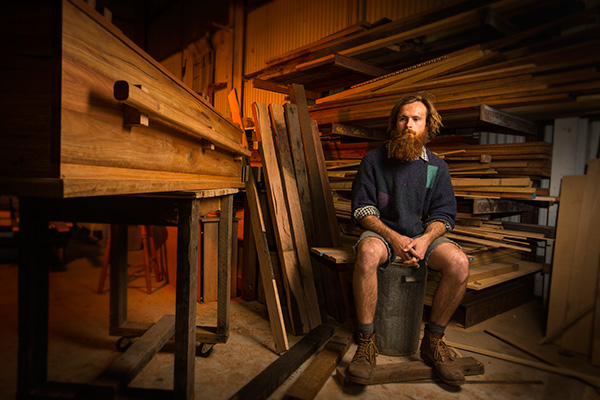October 2, 2014
Handcrafted touch breathes new life into final resting place
Crafting affordable, environmentally responsible funeral caskets and a future for local manufacturing.
It’s their final piece of furniture.
That’s how environmental engineering student Chris Nicholson describes the reality that his elegant, biodegradable funeral caskets that take up to 50 hours to handcraft, end up buried in the ground or burned.
“A lot of people want to be buried or cremated in a low-impact way and to be able to provide that service is very rewarding. Knowing the timber I’m using would have been put in landfill is environmentally satisfying.”
Chris was the winner of the undergraduate category of the UOW Pitch 2014 competition, a university initiative to help staff and students with innovative ideas turn their bright ideas into reality.
The finalists receive training and mentoring that helps refine their idea before they pitch to a panel of experts with a share of the $40,000 cash prize on offer.
For as long as he can remember Chris has found a creative outlet through woodworking. He’s designed and built pieces of furniture using more traditional joinery techniques and timber sourced from demolition of houses.
It was during his time with the Illawarra Flame house, a UOW and TAFE Illawarra student-led project to turn a 1960s-style fibro house into a solar-powered, net-zero energy home of the future, that he saw the amount of timber that was not being recycled or re-used.
The recycled timber cannot be certified and used as a load-bearing structure, leading to limited use in new building construction. As a result, much of the timber ends up in landfill.
“As I was sourcing the timber for the project I saw how much timber ends up in landfill and so I was always thinking about how this resource could be utilised,” Chris said.
“The final piece of the puzzle was a chance meeting with the founder of a non-profit funeral organisation and she told me this problem they have with coffins being overpriced and made out of materials that are not great to bury or incinerate.
“That was the light bulb moment. Here was a resource and now I had a good application.”

The meeting led to Chris working on prototypes for a biodegradable funeral casket made out of recycled or plantation grown timber with minimal-environmental impact.
“Most of the recycled timber I use is from the post-World War II period when areas like the Illawarra were really expanding and they were knocking up these fibro houses. They had a hardwood frame with characteristic fibro cladding. Half a century later a lot of these houses are being demolished and luckily enough the materials used makes them suitable to be recycled.”
Ever on the look out for timber, Chris will often pull up at a demolition site and ask if he can buy or have the wood. He’s struck up relationships with demolition companies and is working on sourcing sustainably grown plantation timber to supplement his operation and provide a steady timber supply.
“Making a casket can be quite straightforward and that’s why they are mass produced,” he said. “The real challenge is when you want to make one without metal or plastic and that introduced a level of complexity in the joinery work and there’s no real shortcuts in doing that.
“Every casket is different; every piece of timber is different. Every casket is unique I have to take into account the size of the person that it’s being built for and then the variations in the timber.
“When I was making the fist casket it did occur to me that it would end up buried or cremated. I just treat it like I’m making someone a piece of furniture. I guess it’s their final piece of furniture.”
Chris has used his pitch prize money to purchase a new industrial sander that will allow him to speed up the labour-intensive construction process. It’s also the first step to fulfilling his other passion of supporting manufacturing in the Illawarra.
“The Pitch competition really validated the idea. Knowing that these people who have experience with startup business and taking ideas and turning them into success stories supported my idea, that gave me a lot of confidence.”
As part of the UOW Pitch 2014 prize he’s also won a scholarship to the iAccelerate Start program, which is an ideas incubator for early-stage businesses.
iAccelerate will on 29 October host its annual Pitch event and Demo Day. This provides an opportunity for entrepreneurial to practise, polish and ultimately pitch their innovative business idea to a panel of experts.
It enables local, national and international investors to support the businesses that are being developing by UOW students like Chis and other local startups.
The flow-on effect will be job creation and economic development in the Illawarra.
"If you’d told me 12 months ago that I’d be starting up a business making biodegradable caskets I wouldn’t have given you much time I think. At no point have I really decided this is it, it’s all eventuated and happened gradually.”